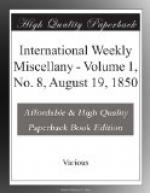“NEANDER, as it is well known, was descended from Jewish parents, by whom he was instructed in the rudiments of religion, and at a subsequent period of life became a convert to the Christian faith, by personal inquiry and experience. He was born at Goettingen, in 1789, but passed a considerable portion of his youth at Hamburg, where he was initiated into the rudiments of a classical education. After he had made a profession of Christianity, he continued his studies for a short time at the Universities of Halle and Goettingen, returned to Hamburg, and finally completed his University career at Heidelberg. The following year he was called to the University of Berlin, as Professor of Theology, where he soon gave promise of the brilliant eminence which he has since attained. His first publications were on special topics of ecclesiastical history, including treatises on ‘The Emperor Julian and his Age,’ ‘St. Bernard and his Age,’ ’The Development of the Principal Systems of the Gnostics,’ ’St. Chrysostom and the Church in his Age,’ and ‘The Spirit of Tertullian,’ with an ‘Introduction to his Writings.’ These treatises are remarkable monuments of diligence, accuracy, profoundness of research and breadth of comprehension, showing the same intellectual qualities which were afterward signally exhibited in the composition of his masterly volumes on the history of the Christian Religion. His earliest production in this department had for its object to present the most important facts in Church history, in a form adapted to the great mass of readers, without aiming at scientific precision or completeness. This attempt was eminently successful. The first volume of his great work entitled ’General History of the Church and the Christian Religion,’ was published in 1825, and it was not till twenty years afterward that the work was brought to a close. The appearance of this work formed a new epoch in ecclesiastical history. It at once betrayed the power of a bold and original mind. Instead of consisting of a meager and arid collection of facts, without scientific order, without any vital coherence or symmetry, and without reference to the cardinal elements of Christian experience, the whole work, though singularly chaste and subdued in its tone, throbs with the emotions of genuine life, depicting the influence of Christianity as a school for the soul, and showing its radiant signatures of Divinity in its moral triumphs through centuries.
“His smaller work on the first development of Christianity in the Apostolic Age is marked by the same spirited characteristics, while his ‘Life of Jesus’ is an able defense of the historical verity of the sacred narrative against the ingenious and subtle suggestions of Strauss.




